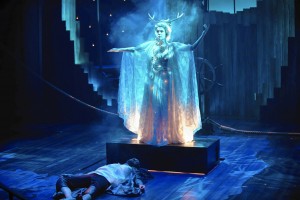In today’s Wall Street Journal drama column I review a Florida show, Orlando Shakespeare Theater’s production of a new, modernized “translation” of Pericles. Here’s an excerpt.
* * *
It’s that the 1929 film version of “The Taming of the Shrew” was credited to “William Shakespeare, with additional dialogue by Sam Taylor.” Not so, alas—that particular Hollywood tale is too good to be true—but it’s certainly the case that few Shakespeare plays are staged as written. Cuts are customary, scenes frequently rearranged. Nor is such tinkering a purely modern notion: Nineteenth-century actors often interpolated new lines and, on occasion, turned sad endings into happy ones, a practice at which no one seems to have boggled overmuch. That’s why I can’t claim to have been struck dumb with righteous horror when the Oregon Shakespeare Festival announced last fall that it had commissioned “translations” of Shakespeare’s plays into “contemporary modern English” in the hopes of making them more intelligible to today’s audiences.
I did, however, wonder why anyone thought such an undertaking useful, much less necessary. Shakespeare, after all, is the world’s most frequently performed playwright, and though the elaborate language of his plays can be intimidating and, on occasion, confusing, that doesn’t seem to stop most people from enjoying them anyway.
 Be that as it may, I chose to withhold judgment on “Play On! 36 Playwrights Translate Shakespeare” until I could see one of the translations staged by a reputable theater company. That’s what brought me to Florida last week to see Orlando Shakespeare Theater’s new production of “Pericles,” which has been “translated” by Ellen McLaughlin, a playwright with whose previous work I am unfamiliar. Not only is Orlando Shakespeare a fine company, but Jim Helsinger, the director, did exceptionally well two years ago by David Edgar’s stage version of “Nicholas Nickleby,” so I figured that he and his collaborators would make the strongest possible case for Ms. McLaughlin’s version. Sure enough, they’ve given us a superior “Pericles,” as persuasive as Terrence O’Brien’s lucid, witty 2009 Hudson Valley Shakespeare Festival staging….
Be that as it may, I chose to withhold judgment on “Play On! 36 Playwrights Translate Shakespeare” until I could see one of the translations staged by a reputable theater company. That’s what brought me to Florida last week to see Orlando Shakespeare Theater’s new production of “Pericles,” which has been “translated” by Ellen McLaughlin, a playwright with whose previous work I am unfamiliar. Not only is Orlando Shakespeare a fine company, but Jim Helsinger, the director, did exceptionally well two years ago by David Edgar’s stage version of “Nicholas Nickleby,” so I figured that he and his collaborators would make the strongest possible case for Ms. McLaughlin’s version. Sure enough, they’ve given us a superior “Pericles,” as persuasive as Terrence O’Brien’s lucid, witty 2009 Hudson Valley Shakespeare Festival staging….
Let me start off by stipulating that Ms. McLaughlin’s translation “works,” by which I mean that it’s both speakable and faithful to the meaning of Shakespeare’s text (or, rather, the text of Shakespeare and George Wilkins, the obscure 17th-century versifier who is now generally thought by scholars to have written most of the first half of the play). But she has rewritten virtually the whole of “Pericles,” stripping out the resplendently Elizabethan language and replacing it with bald, flat-footed verse that is “blank” in every sense of the word. What’s left is a watered-down text that has been systematically denuded of the rich verbal music that makes Shakespeare Shakespeare….
* * *
Read the whole thing here.


